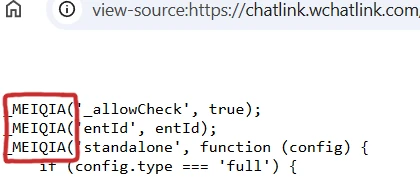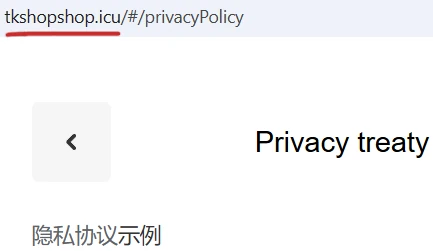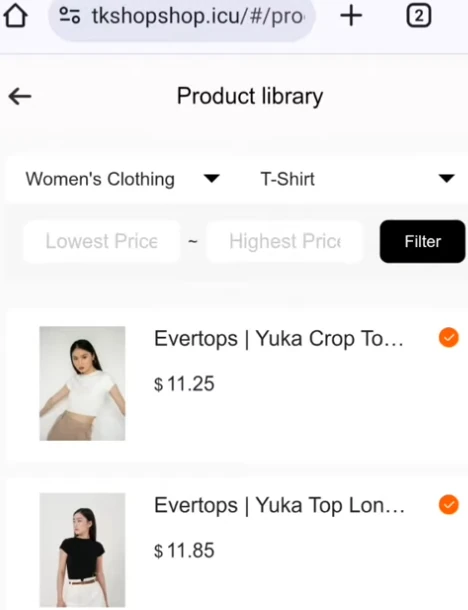TKStore Review: Stolen identity “click a button” Ponzi
TKStore, aka TKShop and TikTokMall, fails to provide ownership or executive information on its website.
TKStore’s website domain (“tkshopshop.icu”), was privately registered on January 1st, 2025.
If we click through to TKStore’s support link, we find it runs on the MEIQIA platform.

Meiqia is a Chinese software company based out of Beijing.
We also find Chinese in TKStore’s “privacy treaty”:

Together this suggests whoever is running TKStore has ties to China.
As always, if an MLM company is not openly upfront about who is running or owns it, think long and hard about joining and/or handing over any money.
TKStore’s Products
TKStore has no retailable products or services.
Affiliates are only able to market TKStore affiliate membership itself.
TKStore’s Compensation Plan
TKStore affiliates invest $50 or more in tether (USDT). This is done on the promise of a passive return.
TKStore pays referral commissions on tether invested by recruited affiliates.
Note that TKStore fails to publicly disclose investment plans or referral commission rates.
Joining TKStore
TKStore affiliate membership is free.
Full participation in the attached income opportunity requires a minimum $50 investment in USDT.
TKStore Conclusion
TKStore is yet another “click a button” app Ponzi scheme.
TKStore misappropriates the name and branding of the TikTok, the Chinese-owned social media platform.

Needless to say TKStore has nothing to do with TikTok.
TKStore’s “click a button” Ponzi ruse is placing fictional orders with online retailers CTL Shop lies about having partnerships with.

Broken down, TKStore’s ruse sees affiliates log in and click a button. The more an affiliate invests the more times a day they have to click buttons.
This button clicking purportedly generates revenue via orders placed with online retailers.

TKStore receives a commission from the orders, which it represents it shares with affiliate investors.
If that makes no sense it’s because it doesn’t. Randoms clicking a button in an app doesn’t equate to genuine customer orders placed with online retailers.
In reality clicking a button inside TKStore’s app does nothing. All TKStore does is recycle newly invested funds to pay earlier investors.
TKStore is part of a group of “click a button” app Ponzis that emerged in late 2021.
Examples of already collapsed “click a button” app Ponzis using the stolen identity ruse are AI-UP, FIS VIP and Salavi88. Fake orders ruse examples are YoCart, TTK and JD Global.
Since 2021 BehindMLM has documented hundreds of “click a button” app Ponzis. Most of them last a few weeks to a few months before collapsing.
“Click a button” app Ponzis disappear by disabling both their websites and app. This tends to happen without notice, leaving the majority of investors with a loss (inevitable Ponzi math).
As part of a collapse, “click a button” Ponzi scammers often initiate recovery scams. This sees the scammers demand investors pay a fee to access funds and/or re enable withdrawals.
If any payments are made withdrawals remain disabled or the scammers cease communication.
Organized crime interests from China operate scam factories behind “click a button” Ponzis from south-east Asian countries.
In September 2024, the US Department of Treasury sanctioned Cambodian politician Ly Yong Phat over ties to Chinese human trafficking scam factories.
Through various companies he owns, Phat is alleged to shelter Chinese scammers operating out of Cambodia.
Myanmar claims to have deported over 50,000 Chinese scam factory scammers since October 2023. With “click a button” app scams continuing to feature on BehindMLM though, it is clearly not enough.
In late January 2025, Chinese ministry representatives visited Thailand. The stated aim of the visit was to tackle organized Chinese crime gangs operating from Myanmar.
In early February 2025, Thailand announced it had cut power, internet access and petrol supplies to Chinese scam factories operating across its border with Myanmar.
Regardless of which country they operate from, ultimately the same group of Chinese scammers are believed to be behind the “click a button” app Ponzi plague.
Update 8th March 2025 – TKStore has collapsed. As at the time of this update TKStore’s website is no longer accessible.

